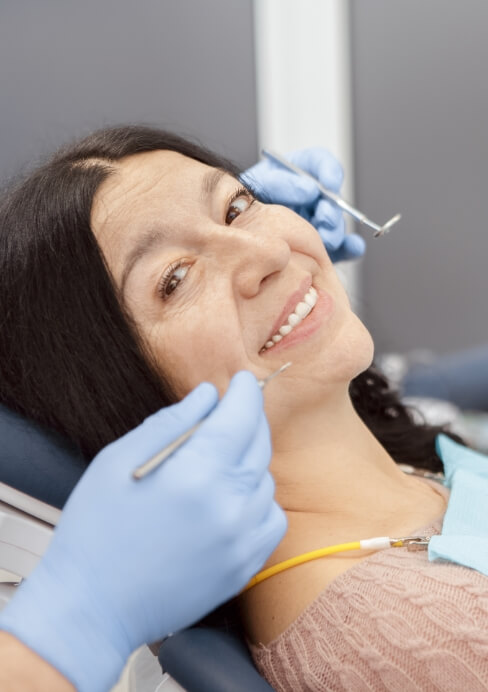Senior Dentistry – Pasadena, TX
Taking Care of Elderly Smiles
We understand the challenges that may arise as a person ages; that’s why our dental office provides compassionate dental care that caters to the unique needs of our elderly dental patients. A person with arthritis, for instance, may neglect daily oral care due to movement problems that interfere with brushing and flossing. Additionally, many senior dnetal patients take medications that cause side effects, such as dry mouth, that contribute to decay. Some may not have seen a dentist in years. Finding a dental office that specializes in treating older patients and has the expertise to earn the trust of seniors is essential to a positive dental experience and lasting oral health. Call us today to learn more about senior dentistry from our Pasadena, TX dentist.
Why Choose Pasadena Family Dentistry for Senior Dentistry?
- Long-Lasting, Reliable Dentures
- Compassionate, Friendly Dentists
- Comfortable, Homey Dental Office
Understanding the Challenges

Our dentists have experience catering to elderly patients and are well-versed in the unique challenges commonly associated with senior dental health, such as the following:
- Inability to brush and floss properly. Medical conditions that affect movement, such as arthritis in the hands and fingers, make daily brushing and flossing difficult, if not outright impossible, to perform. It’s essential that patients who have difficulty brushing see their dentist regularly for thorough cleanings and exams. The dentist may also recommend a power toothbrush to make daily oral hygiene more comfortable.
- Dry mouth. Medications, cancer treatment, and certain diseases contribute to dry mouth. Many seniors attempt to curb dry mouth by sucking on hard candies, which greatly increases a person’s risk of gum disease and tooth decay. The dentist will provide thorough exams to detect early warning signs and offer oral hygiene tips that will help restore moisture. In general, people with dry mouths should drink plenty of water, chew sugar-free gums and candies, and use fluoride toothpaste and mouth rinse.
- If you wear dentures, the dentist will check to make sure they fit properly, look for any irritation in the mouth, and examine the appliance for wear and tear. Aside from general discomfort, ill-fitting dentures can lead to more serious oral health concerns. Most dentures need to be relined or replaced every 7 to 10 years to ensure optimal function and comfort.
A Compassionate Approach

Providing comprehensive dental care for people with special needs requires a high level of expertise, patience, and compassion. Fortunately, advances in dentistry have significant benefits for elderly patients. Oral or intravenous sedation allows for even the most complex procedures while patients sleep. Less invasive procedures minimize recovery time. Even patient education has improved with new tools to help illustrate oral care techniques for both patients and caregivers. Overall, with a dentist who understands the special needs of elderly patients, oral healthcare can be a positive and empowering experience for everyone involved.
